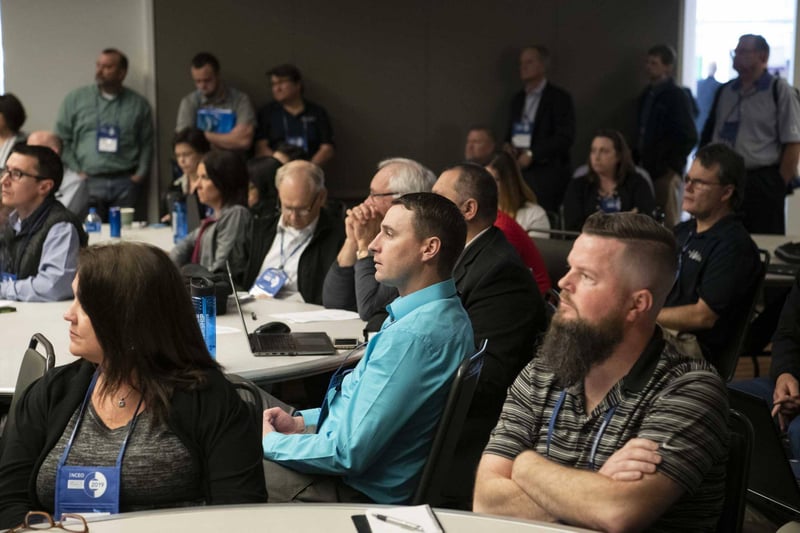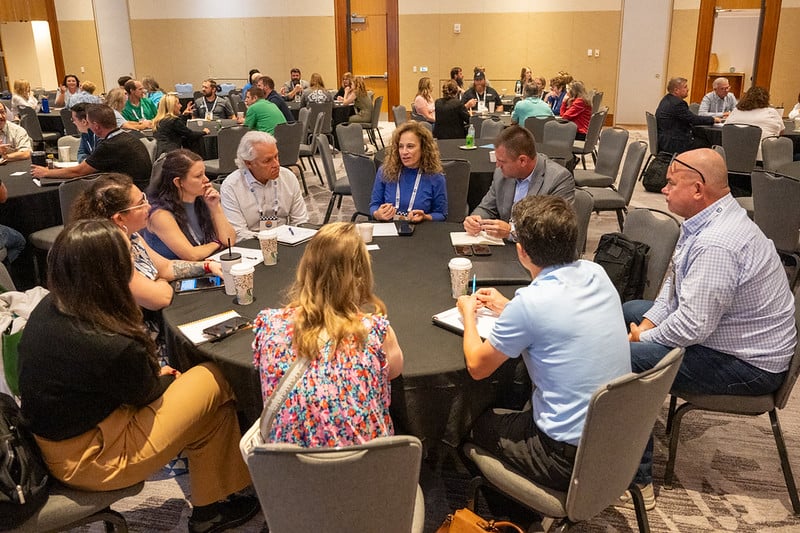Welcome to the speaker proposal guidelines for the 2026 NCEO Annual Employee Ownership Conference happening in Milwaukee April 6-9, 2026. We are looking for passionate speakers to share their expertise, innovative strategies, and real-world solutions to empower employee-owners and leaders within the NCEO community.
With a solutions-focused agenda and over 120 breakout sessions planned, we are proud to present reliable, objective information and valuable resources that help companies from new to mature ESOPs thrive. Both new and experienced speakers are encouraged to apply.
Please review the following information in full before beginning your submission to ensure your content is aligned with the goals for the event.
Important Dates
Submission Deadline: October 10, 2025
Speaker Notification: Mid-December 2025
Why Speak at the NCEO Annual Conference?
.jpg?width=800&height=533&name=2025%20Speakers%20(111).jpg)
Speaking at our conference is a great way to engage with the employee ownership community and share your unique insights from the perspective of an employee-owner or a service provider professional.
- Share Your Expertise: Showcase your knowledge and experience with employee-owners, enhancing their understanding and engagement.
- Boost Your Visibility: Increase brand awareness and establish yourself or your organization as a leading expert in the field.
- Share Your Story: Inspire employee-owners by leveraging your company’s best practices while offering practical solutions drawn from real-world experience.
What Makes a Session Stand Out?
We are looking for sessions that are innovative, engaging, and solutions-oriented. We want attendees to be active participants, not just passive listeners. A successful session:
- Is Innovative and Original: We are looking for creativity and will prioritize new abstracts that have not yet been presented at any employee ownership conference. For evergreen topics, we encourage you to find a fresh, creative way to present it.
- Encourages Robust Discussion: The goal is high-level audience engagement where participants have robust discussions and leave with tangible tools and real solutions.
- Presents Real-World Experience: We especially encourage company speakers to share their innovations, what they are doing well, and lessons learned along the way. This is a chance for you to help make the event fantastic by sharing your direct experiences.
- Focuses on Learning, Not Sales: Content must be educational with no product or service pitches.

How We Evaluate Your Submission
Your submission will be evaluated on the following criteria to ensure a high-quality and relevant conference program.
Innovation and Originality: The creativity, freshness, and uniqueness of your topic and approach.
Audience Engagement and Interaction: The degree to which your session actively engages participants.
Content Value and Relevance: How valuable and relevant the content is for NCEO members and attendees.
Topic Appeal: The overall appeal and compelling nature of your topic for the target audience.
Speaker Experience and Credibility: Your expertise and credibility on the topic.
Track Alignment: How well your submission aligns with the selected track. Be sure to review all tracks and focus areas below before submitting.
A Few Guidelines
Panels: We welcome panels with up to four speakers. The most impactful sessions often feature a diverse set of perspectives, including company speakers and service providers from different firms.
Service Providers: To ensure this diversity, only one service provider from the same firm is permitted per submission. We highly encourage you to partner with other service providers and companies to bring a unique and well-rounded perspective to your session.
No Repeat Presentations: We are looking for new content, fresh perspectives, and creative delivery.
Session Topics: Tracks and Focus Areas
Our 2026 conference curriculum has seven topic tracks, shown below. In selecting our content for each track, we are looking for sessions that address one of several specific focus areas within that track. When submitting your proposal, you'll be prompted to select the focus area that best aligns with your presentation's primary theme.
Please take some time to review the tracks and focus areas shown below in preparation for submitting your proposal. Click a track to expand.
Important
To ensure your submission is reviewed by the most appropriate subject matter experts, please carefully review all tracks and focus areas below.
Sessions focusing on how to successfully expand an employee-owned business.
When submitting your proposal, you'll be prompted to choose one of the following focus areas:
Acquisitions
Holding Company Strategy
Scaling an ESOP Company
Accessing Capital
Culture Preservation through Growth
Content dedicated to the foundational principles and best practices for governing an ESOP company.
When submitting your proposal, you'll be prompted to choose one of the following focus areas:
ESOP Governance Basics
Fiduciary Responsibilities and Legal Issues
Composition, Recruiting and Board Succession
Board Development and Training
Board Responsibilities
Sessions exploring how to build and maintain a strong, high-performance culture of ownership.
When submitting your proposal, you'll be prompted to choose one of the following focus areas:
Foundations of Ownership Culture
Financial Literacy for EO
Building Momentum Year Round
Employee Engagement & Shared Responsibilities
Accountability & High Performance Culture
Storytelling & Communicating Success
Content focused on improving business efficiency, managing risk, and leveraging technology within an ESOP.
When submitting your proposal, you'll be prompted to choose one of the following focus areas:
Valuation and Accounting
ESOP Administration
Leveraging Technology for Operational Efficiency
Risk Mitigation and Resilience
Plan Design Implications & Iterations
Second Stage Transactions
Regulatory Updates
Market Uncertainty
Discussions on ensuring the long-term financial stability and sustainability of an ESOP.
When submitting your proposal, you'll be prompted to choose one of the following focus areas:
Sustainable ESOP Operations
Long-Term Financial Stability
Advanced ESOP Plan Design
Repurchase Obligation Strategies
Mature ESOP Issues
Cash Management Strategies
Sessions on strategic planning, empowering leaders, and navigating change within an employee-owned culture.
When submitting your proposal, you'll be prompted to choose one of the following focus areas:
Strategic Planning / High Involvement Planning
Innovative Company Practices
Leading in an Employee-Owned Culture
Empowering ESOP Leaders & Champions
Succession Development at all Levels
Navigating Change
Content centered on recruiting, training, and retaining talent in an ESOP environment.
When submitting your proposal, you'll be prompted to choose one of the following focus areas:
Talent Acquisition
Recruiting and Onboarding Strategies
Compensation & Benefits Planning
Performance Management & Reviews
Conflict Resolution & Employee Relations
Leveraging Technology
Legal Compliance & HR Policies
Session Formats
Our educational approach is evolving to emphasize solutions-oriented sessions that encourage active participation. We've moved beyond traditional presenter-led sessions in favor of more interactive formats, including:
- Workshops: Hands-on sessions with interactive exercises and expert guidance focused on building practical tools and solving real challenges.
- Small Group Breakouts: Sessions centered on collaborative discussions in focused, small groups.
- Coaching/Facilitation: One-on-one or small group support led by an expert facilitator.
- Other: If your session doesn't fit into one of the above categories, select the "Other" format option.
When developing your proposal, consider how your content can create a compelling and engaging learning experience. This could include interactive polls, hands-on activities, a robust Q&A session, or small-group discussions. Be sure to describe your proposed interactive elements in your submission.

Frequently Asked Questions
What are the guidelines for presenting?
Can I present more than one time at the event?
What if I've presented this topic before?
What if I am unsure of the correct track or focus area?
What happens if I am not selected?
Do I have to be an NCEO member to present?
How much does it cost to present at the conference?
What happened to the old PDF with speaker guidelines?
Need help?
For questions about the Call for Speakers or the submission process, please contact us at: eventhelp@nceo.org.
Ready to apply?
Before applying, please make sure you've fully reviewed the guidelines on this page.
We've made it easy to submit your proposal. You will submit on a brand new site, so all speakers—new and returning—must create a login and profile to begin.
